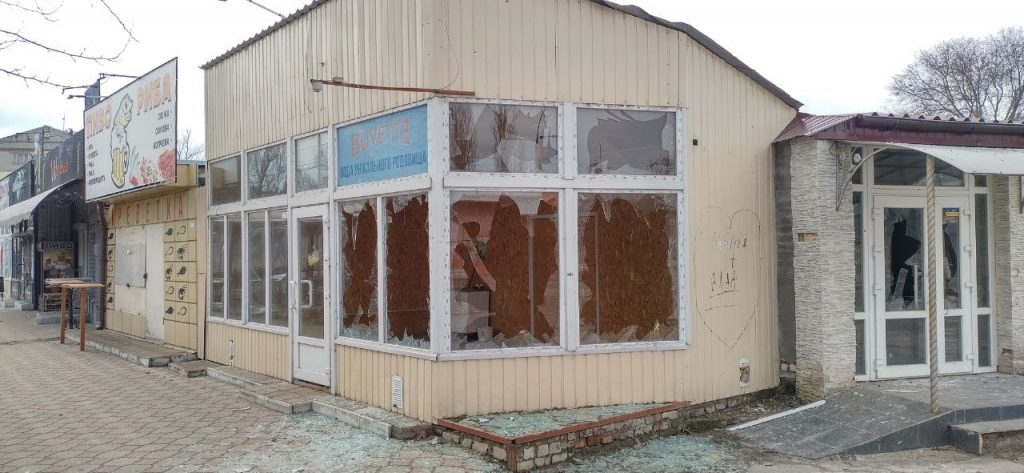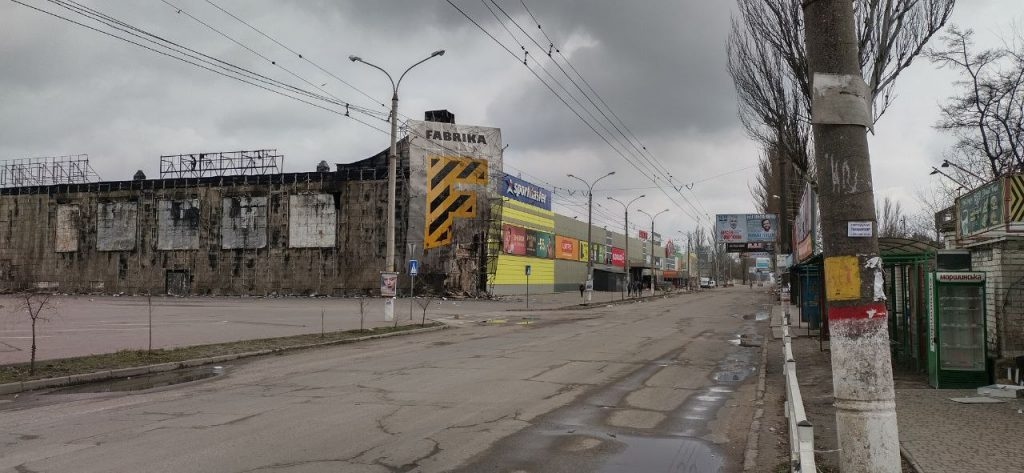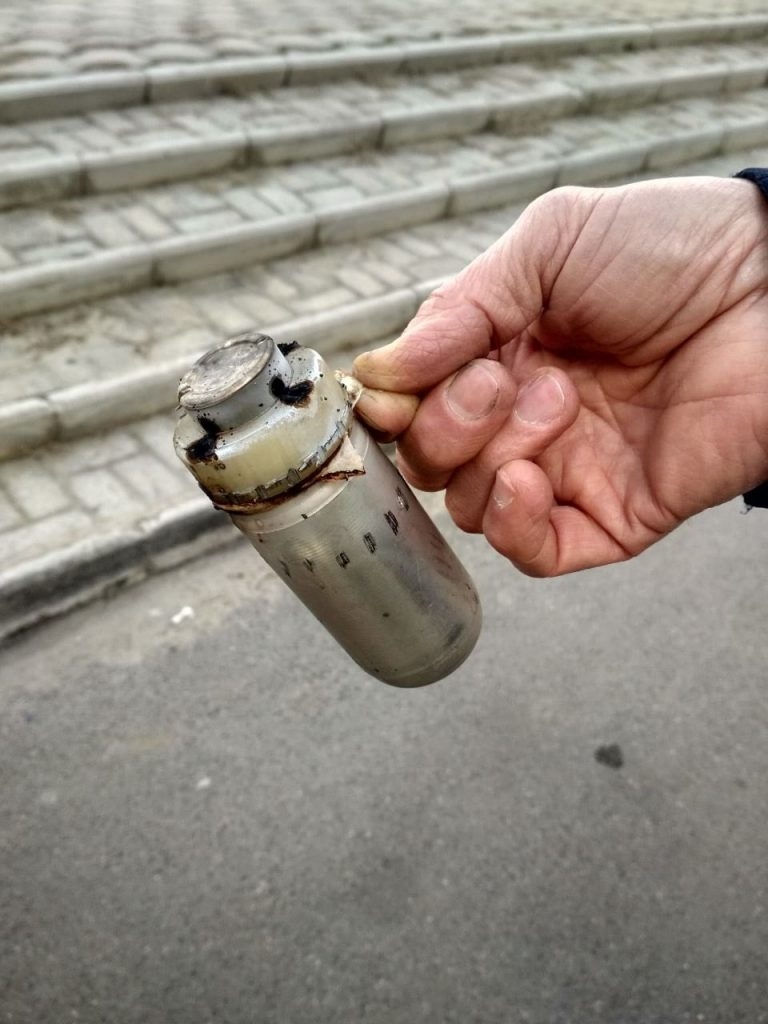Facing resistance in occupied Kherson, Russian forces crack down on disobedient residents

Editor’s Note: The Kyiv Independent used false names for all sources who spoke from Kherson Oblast for this story, for the sake of security.
Life is getting worse in the city of Kherson, which has been occupied by Russian forces for nearly a month.
The near-total absence of critical drugs for chronic diseases like diabetes and high blood pressure has left people who depend on them in a critical state. Food remains scarce and expensive, while the ability to buy it is limited and takes up the majority of the locals’ day.
“In general, life ends at 3 p.m.,” said Yulia, a local resident. "The stores work until 3. Thankfully, transportation works. People go to the markets, stand in line and come back home. City services are operational but they also have shortened workdays."
Kherson, a regional capital in southern Ukraine, is the only major city that the Russians managed to take control of. But the resistance inside Kherson hasn’t died with occupation.
As the Russian forces grow increasingly impatient and frustrated with constant pro-Ukrainian protests, their ferocity has greatly increased over the past week. Violent crackdowns and abductions are on the rise as yet-unconfirmed threats of mass deportations loom.
Journalists, once left alone, have shifted into working underground to avoid drawing attention from the Russian forces. As fighting continues near Kherson and multiple Ukrainian cities face devastation, locals fear that they may be subjected to the same atrocities.
Battles are reportedly ongoing near Kherson. News sources including AFP and New York Times cited a Pentagon official on March 25, who said that Russians are losing control of the city and that it’s once again “contested.” Local residents denied this, saying Russian forces still patrol the streets in force. However, residents have reported hearing loud explosions happening not far from the city at night.
“The battles are ongoing between Chornobaivka and Mykolaiv,” said Valentyn, who lives in Chornobaivka, a village outside Kherson, where Ukrainian forces have counterattacked a nearby airfield 11 times since Feb. 24, according to the President’s Office. “But it’s getting closer and closer to us. Evidently, our forces are advancing because we hear the fighting more and more.”
Supply shortages
Igor, an entrepreneur who helps operate a chain of bakeries in Kherson, says that his supply chain has been in a sorry state since the occupation. Bakery employees have had to drive around villages and towns throughout the area, as well as scour the internet to look for basic goods like flour, butter and sugar, often finding none.
"It's getting harder and harder since no one has any left," Igor said. "Prices have gone up by three to five times. This reflects on the price of bread."
Shortages in the city have been partly alleviated by deliveries of vegetables and other goods from local villages according to Kostiantyn, a broadcast journalist in Kherson. These goods are delivered mainly to marketplaces, as stores and supermarkets have largely shut down, amid looting by Russians.
“The Russian army seizes stuff from the supermarkets on a daily basis," Kostiantyn said. "We saw them carrying out appliances, microwaves and such, loading them up and sending them all somewhere. Now all the big stores are completely looted and they (Russians) have turned to looting the smaller ones."

The lines at outdoor markets are extremely long and going there to buy food is often an all-day affair, sources told the Kyiv Independent.
According to a BBC report from March 22, a poultry farm outside the nearby village of Chornobaivka was left without sufficient feed for its 3 million birds and started handing them out so local residents could at least make use of them. Volunteers delivered chickens into the city, across residences, hospitals and children's shelters.
Igor pointed out that not only are the prices high, the sellers often insist on being paid in cash, which isn’t easy to come by. People can begin to line up at ATMs at 5 a.m., just to wait for hours to be able to withdraw a maximum of Hr 1,000 ($34).
Valentyn said the sellers want cash because they say they can’t pay for the food they bring in otherwise. Recently, he said, more have started accepting electronic payments in his village.
Food shortages are just part of the problem. The other part is the lack of fuel. Because it’s so hard to come by, the range of delivery trucks is extremely limited, meaning they can’t go out very far to try to find supplies.
The bigger problem is with medicine. “The biggest deficit is for medicines for people with chronic diseases, such as diabetes, there’s almost no insulin,” said Yulia.
The Guardian quoted locals as saying that more people are dying from lack of medication than from bullets.
Others have corroborated this claim. Medications that people depend on to treat cardiac conditions or high blood pressure are virtually absent and there have been absolutely no deliveries since the occupation began. The Russian forces have not let any humanitarian convoys through, locals said.
According to Yulia, hospitals are still equipped with medication and if a person ends up in a hospital, there’s a higher chance that they can get the drugs they need. In pharmacies, however, it’s virtually impossible to get any painkillers or even something as basic as Valerian root.
Volunteers are trying their best to relieve these shortages but their options are limited.
Journalism crackdown
The work of journalists, especially broadcasters, has changed tremendously, according to Kostiantyn. Those who are identifiable as the media now have a target on their back.
“We’re TV people and the presence of a microphone or camera used to be a defense,” he said. “Now, to appear with a camera or a mic is practically impossible – it immediately attracts attention. The scariest thing that has begun in Kherson is the repressions, including against journalists.”
The Russians shut down local channels in the earliest days of the occupation, switching them over to Russian broadcasts, he said. Cable TV held out for a week longer until it was simply shut off. Now, tuning into cable just displays dead air.
Kostiantyn’s team, which used to work exclusively in the video medium, using conspicuous equipment, has had to adapt. Good equipment is now only used to shoot video packages indoors, in secure locations, producing stories about life in shelters or the work of volunteers.
All shooting and audio recording on the street is done with easily-concealable phones or voice recorders.
The news format switched away from video and towards text, with many more longreads being posted, as people being stuck at home are reading more. Almost all work is done remotely.

Even so, journalists continue to face interference. Sites have been hit with distributed denial of service attacks. “They won’t let us work,” said Kostiantyn.
Journalists have also received threats, including Kostiantyn’s colleagues. “This includes calls and letters and social media messages saying ‘watch what you write, this will be Russia, why do you need the trouble? Stop your activity.’ And then various insults.”
It hasn’t stopped there. Journalists have also been abducted and interrogated, like Oleh Baturin, a journalist for the Novy Den newspaper in Kherson Oblast, who was seized from the city of Kakhovka on March 12.
Over the course of his ordeal, he said the Russians interrogated him, trying to find supposed figureheads behind the daily protests that enveloped Kherson since the occupation began. He was released on March 20.
Growing hostility
The local sources confirmed that the Russians have made it their top priority to try to hunt down the supposed organizers of the daily protests against occupation that have been held in the center of the city since early March.
“I get the impression that they can’t understand who is the ‘main instigator’ of these demonstrations, so they started to intensely abduct activists and well-known people in the city,” said Yulia. “A few days ago, they abducted the director of a drama theater.”
The media reported that the director, city deputy and opinion leader, Oleksandr Kniga, was seized and questioned about the supposed organizers of the rallies before being released, which he confirmed.
Yulia said that some of the Russian forces really appeared to think that they were liberators and really believed that there was some mastermind out there, pushing locals to protest. They weren’t able to consider the possibility that people who care about freedom, democracy and self-determination are self-organizing.
“They need to have some kind of shepherd to control them and they can’t understand why we come out – they have this idea that we’re being forced and coordinated centrally,” she said. “It’s funny and sad at the same time.”
Even though people like Yulia are able to find humor in the Russians’ mentality, the crackdowns are deadly serious. Previously, Russians have let the protests run their course or tried to drown them out by blasting audio from old Soviet cartoons, Kostiantyn said. Now, as soon as they see any gathering taking place in the city center, they bring out a convoy of paddy wagons and deploy large formations of armor-wearing, assault rifle-wielding forces, able to arrest hundreds of people.
Last week, Russians deployed tear gas and flashbang grenades against the protesters and even opened fire with live rounds, wounding at least one local resident, locals told the Kyiv Independent. For all of these reasons, demonstrations have shrunk dramatically from thousands of people to less than a hundred.
“In the past week, these meetings were dispersed by force – with flashbangs, tear gas, clubs, arrests and beatings,” said Kostiantyn. “Everyone has breathed in some tear gas by now.”

Igor, who was part of the EuroMaidan protests in 2014, added that many people, including himself, have had armed Russians come to their houses to conduct a search and ask questions. The men would then leave with a threat of “serious problems” if the resident ever caught their attention again.
“There’s no rule of law, it’s not like you can call a lawyer. They just do what they want,” Igor said. “They can break down your door, seize you, take you to an unknown location, interrogate you. Here, people are completely undefended.”
“When seven armed men show up to your house at 6 a.m and tell you that the next time they see you at a protest, they’ll simply take you somewhere and lose you, then of course it forms an impression,” he added.
Asked if he’s seen any run-ins with the Russians, Valentyn described how two young local men, who were probably drinking alcohol on the street in Chornobaivka, were shot by Russian forces who may have thought they were preparing Molotov cocktails in the bottles. The Russians also fired on a civilian car that was driving through the village.
British publication The Times reported that the Russians’ patience has run out in Kherson and they were considering large-scale terror against the locals, including the possibility of mass deportations. Most sources who spoke to the Kyiv Independent find this plausible, in light of the reports that Russians have forcibly deported thousands of people from Mariupol, a besieged seaport in southern Ukraine, into Russia.
Kostiantyn reported a heavy presence of black-clad Russian National Guard personnel in the city, who are deployed in force every time people gather to demonstrate.









